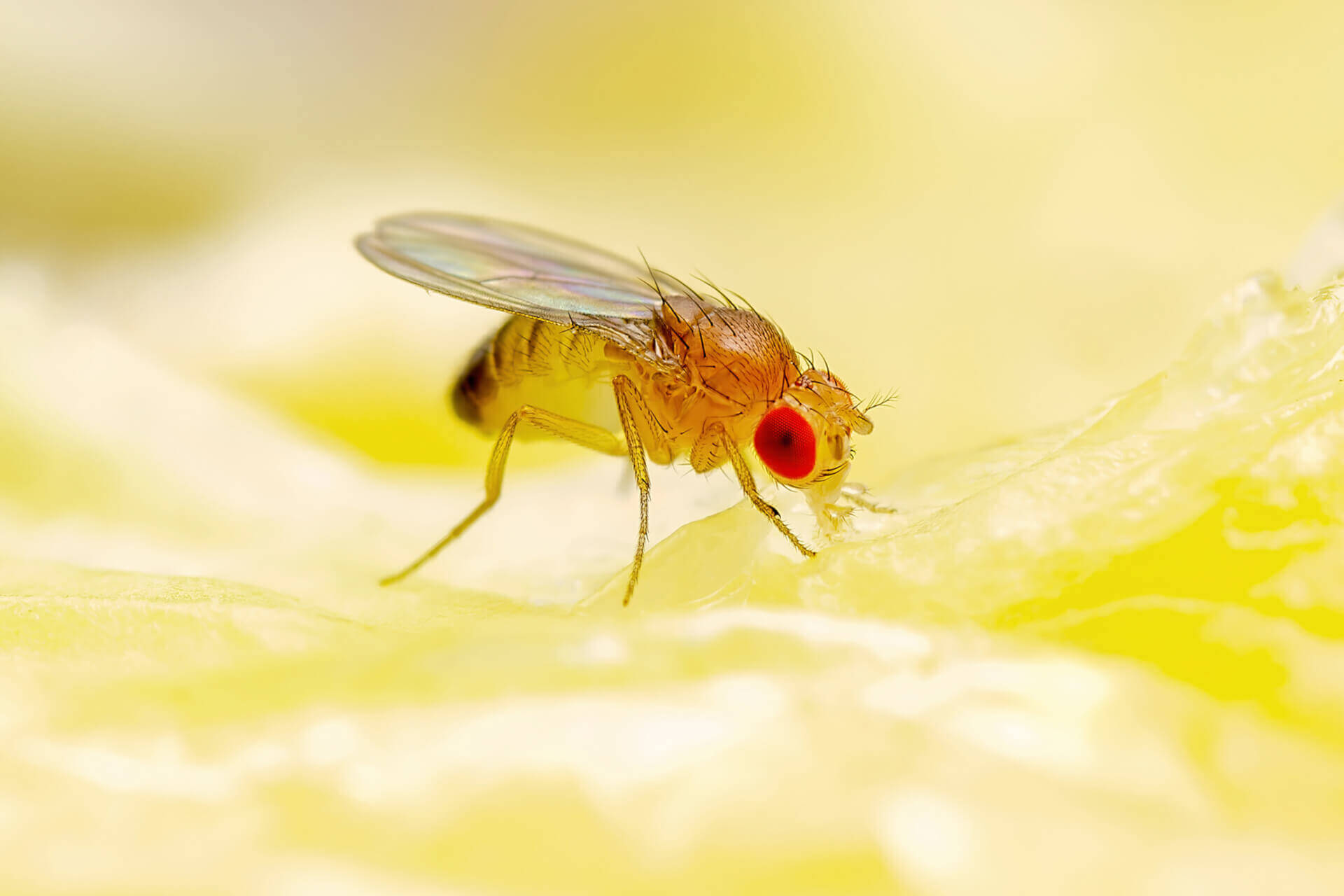Fruit Fly Facts & Information
Everything you need to know about fruit flies
what do Fruit Flies look like

Fruit flies are a very small oval fly with adults growing only to be 1/8 inch in length. Their thorax is tan, and their abdomen is black with a gray underbelly. Fruit flies often have red eyes, although some can have dark colored eyes. If anyone tells you they can completely control a fly situation, they are fooling you. A good fly exterminator will help you with the strategies you can employ to keep flies under control.
Fruit flies are attracted to and eat rotting food. They especially like fruits and vegetables as well as fermenting liquids like beer, liquor, and wine. Fruit flies are also attracted to and sometimes breed in dark, moist, and unsanitary environments like drains, garbage disposals, and trash bins where rotting produce materials may collect.
Because they reproduce very quickly, fruit fly extermination can be difficult. Female fruit flies can lay around 500 eggs, which can hatch in as little as 24 hours. Similar to other fly species, fruit flies have a four-stage lifecycle, which can be completed in as little as a week in ideal conditions.
Not the fly you have?
Fruit flies are attracted to and eat rotting food. They especially like fruits and vegetables as well as fermenting liquids like beer, liquor, and wine. Fruit flies are also attracted to and sometimes breed in dark, moist, and unsanitary environments like drains, garbage disposals, and trash bins where rotting produce materials may collect.
Because they reproduce very quickly, fruit fly extermination can be difficult. Female fruit flies can lay around 500 eggs, which can hatch in as little as 24 hours. Similar to other fly species, fruit flies have a four-stage lifecycle, which can be completed in as little as a week in ideal conditions.
Not the fly you have?
how did i get fruit flies
Fruit flies are often seen flying around in kitchens or trash cans near the rotting or decaying fruit and produce. Another sign of an infestation is the mature larvae of fruit flies that crawl out of breeding material to pupate in a nearby spot. Fruit flies are a type of fly found throughout the United States that often infest homes containing ripe, rotting, or decayed fruit and produce. They are known for their ability to rapidly reproduce and can be found indoors year-round. Depending on the conditions, fruit flies can live 25 to 30 days. Fruit flies make their way into the home though open doors or windows if they sense a food source, or sometimes via garden crops. They are also attracted to overripe fruit on the counter or any fermenting matter in drains, mops, and trash bins. Mitigating all of those attractants can help. Be sure to throw away rotting fruit and wipe up sweet drink spills with a disinfecting product.
what Problems do fruit flies cause
Fruit flies are mostly just a nuisance, but they can become a large infestation pretty quickly in the right environment. They are also an indication of a much larger sanitation issue whether it means your dishwasher needs to be cleaned, there are spills and crumbs that have been left to rot, and/or your trash areas are not being cleaned or empty frequently enough. Not only are fruit flies a nuisance pest but, much like house flies, they are also capable of contaminating food with harmful bacteria and disease-causing pathogens. That’s what fly control is more about fly prevention than fly treatments. We can educate you on those tactics.
how can i prevent fruit flies
A major step in fruit fly prevention is the elimination of their feeding and breeding grounds. If you identify a fruit fly infestation in your kitchen, dispose of all over-ripe or decaying fruit and produce. In addition, be sure that all windows and doors are sealed properly to prevent fruit flies from entering your home in the first place. Sanitation is important to keep these fruit flies out since they are attracted to very specific things. Regularly wipe counters and empty trash cans. Clean drain lines, garbage disposals, and any location where food waste accumulates. Store produce in air-tight containers or in the refrigerator and inspect any fruits or vegetables brought into the home for fruit flies.
WHY WESTERN for fruit fly control
We’re passionate about controlling flies in your home or business because we live and work here – it’s our neighborhood, too. With our almost 100 years of experience keeping homes and businesses in Connecticut, Delaware, New Jersey, New York, and Pennsylvania safe from pests, Western has the experience you can trust.
100% Satisfaction Guarantee
24-Hour Guaranteed Response
Board Certified Entomologists
Need help with fruit flies?
GET MY QUOTE
